B0041VYHGW EBOK (47 page)
Authors: David Bordwell,Kristin Thompson

In other films, costumes may be quite stylized, calling attention to their purely graphic qualities. Throughout
Ivan the Terrible,
costumes are carefully orchestrated with one another in their colors, their textures, and even their movements. One shot of Ivan and his adversary gives their robes a plastic sweep and dynamism
(
4.33
).
In
Freak Orlando,
Ulrike Ottinger (herself a costume designer) boldly uses costumes to display the spectrum’s primary colors in maximum intensity
(
4.34
).
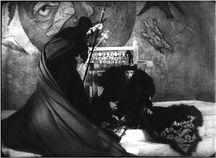
4.33 The sweeping folds of a priest’s lightweight black robe contrast with the heavy cloak and train of the czar’s finery in
Ivan the Terrible.
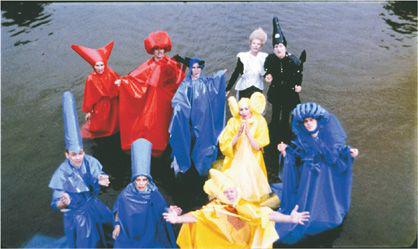
4.34 Stylized costumes in
Freak Orlando.
Costumes can play important motivic and causal roles in narratives. The film director Guido in Fellini’s
8½
persistently uses his dark glasses to shield himself from the world
(
4.35
).
When Hildy Johnson, in
His Girl Friday,
switches from her role of aspiring housewife to that of reporter, her hats change as well
(
4.36
,
4.37
).
In the runaway bus section of
Speed,
during a phone conversation with Jack, the villain Howard refers to Annie as a “Wildcat”; Jack sees Annie’s University of Arizona sweater and realizes that Howard has hidden a video camera aboard the bus. A costume provides the clue that allows Jack to outwit Howard.
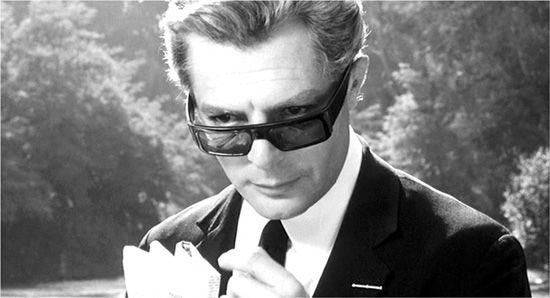
4.35 In
8½,
sunglasses shield Marcello from the world.
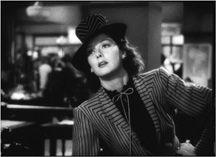
4.36 Hildy’s stylish hat with a low-dipping brim worn early in
His Girl Friday …
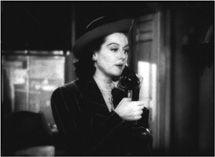
4.37 … is replaced by a “masculine” hat with its brim pushed up, journalist-style, when she returns to work.
As we have already seen in
Tampopo
and
L’Argent
(
p. 124
), costume is often coordinated with setting. Since the filmmaker usually wants to emphasize the human figures, setting may provide a more or less neutral background, while costume helps pick out the characters. Color design is particularly important here. The
Freak Orlando
costumes (
4.34
) stand out boldly against the neutral gray background of an artificial lake. In
The Night of the Shooting Stars,
luminous wheat fields set off the hard black-and-blue costumes of the fascists and the peasants
(
4.38
).
The director may instead choose to match the color values of setting and costume more closely. One shot in Fellini’s
Casanova
creates a color gradation that runs from bright red costumes to paler red walls, the whole composition capped by a small white accent
(
4.39
).
This “bleeding” of the costume into the setting is carried to a kind of limit in the prison scene of
THX 1138,
in which George Lucas strips both locale and clothing to stark white on white
(
4.40
).
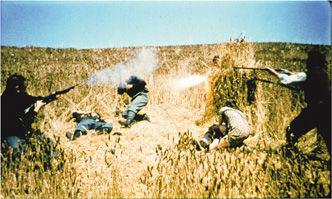
4.38 The climactic skirmish of
The Night of the Shooting Stars.
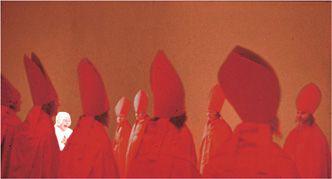
4.39
Casanova:
subtle color gradations and a dramatic accent in the distance.
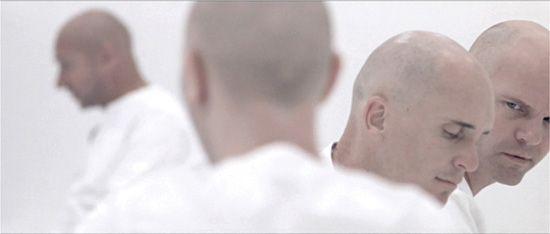
4.40 Heads seem to float in space as white costumes and settings blend in
THX 1138.
Ken Russell’s
Women in Love
affords a clear example of how costume and setting can contribute to a film’s overall narrative progression. The opening scenes portray the characters’ shallow middle-class life by means of saturated primary and complementary colors in costume and setting
(
4.41
).
In the middle portions of the film, as the characters discover love on a country estate, pale pastels predominate
(
4.42
).
The last section of
Women in Love
takes place around the Matterhorn, and the characters’ ardor has cooled. Now the colors have become even paler, dominated by pure black and white
(
4.43
).
By integrating with setting, costume may function to reinforce narrative and thematic patterns.
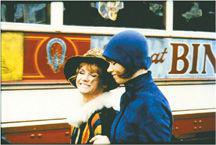
4.41 Bright colors in an early scene of
Women in Love
give way …

4.42 … to the softer hues of trees and fields …
